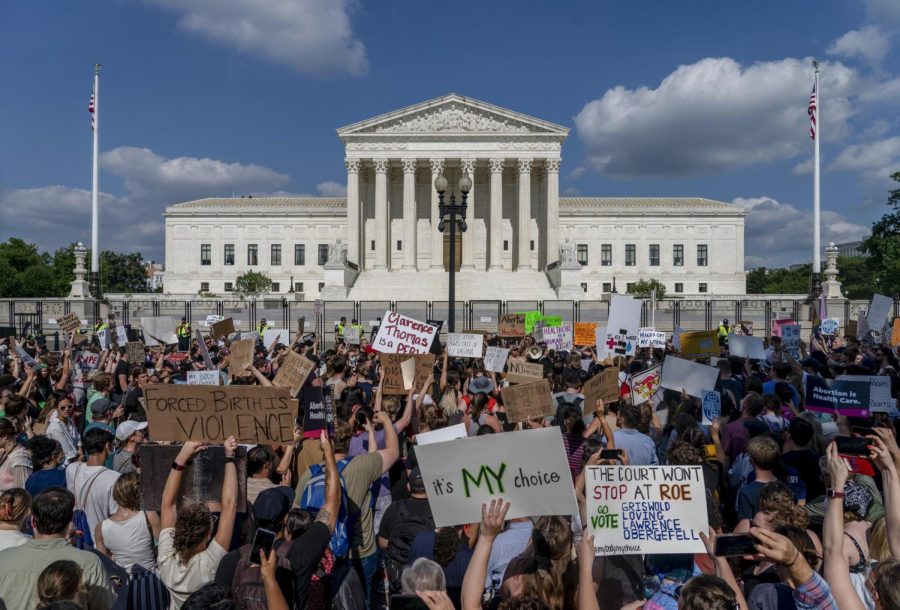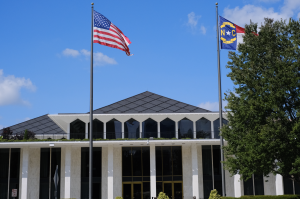Where we stand: The failures of white feminism and Roe v. Wade
The current reproductive rights movement lacks an intersectional analysis
Courtesy of the Associated Press
The analysis of white feminism on abortion rights, especially related to Roe v. Wade, ignores histories of racist violence, writes Iyana Trotman.
August 2, 2022
On June 24, 2022, the Supreme Court overturned one of this country’s landmark cases, Roe v. Wade, in a 5-3-1 decision. The decision, like so many other civil rights decisions, was centered around the Fourteenth Amendment and the Equal Protection Clause. It was determined that issues of reproductive health and abortion could once again be legislated by states — the “founding fathers” had not intended on making choices regarding reproductive health since the Constitution does not confer the right to an abortion. This overturn was not shocking, primarily because the majority opinion was already leaked in May. Still, it sent waves of disappointment across the country, where 13 states have trigger abortion bans and 13 others spanning across the South and Midwest will quickly follow suit.
Protests erupted around the country in defense of Roe v. Wade, mainly led by groups of white women who decried the “sexism of the state” and the need to “alter and abolish the government” — a reference to the Declaration of Independence. One thing remains clear; the fight for reproductive rights seen so strongly across the country lacks an analysis of the struggles of Black people and blatantly ignores the lives of transgender and gender non-conforming people. This is a tale as old as time, where white, cisgender feminists cling to sexism to facilitate proximity to violence and oppression while maintaining and upholding systems of violence that both ignore and disavow the lives of Black people. In the era of the overturn of Roe v. Wade, this could not be more true.
J. Marion Sims, “the father of modern gynecology”, experimented on enslaved people in an attempt to develop some of the medical techniques used today, including the speculum and Sims Position for examination, dilation and curettage procedures. The Black women that he experimented on included Anarcha, who underwent 30 painful surgeries without consent or anesthesia across plantations in Alabama. These produced revolutionary findings, which Sims took to Europe to perform on wealthy white women who were obviously sedated and then to New York for white women who were struggling to produce children. The consequences of overturning Roe v. Wade are not new to Black women, who have always been imagined as property and never given the choice to consent. This is evident when looking at the forced sterilization of Black people in prisons, the fact that Black people have the highest maternal mortality rate and the rampant medical racism in the field of gynecology. Meanwhile, top physicians like Sims are praised for their accomplishments without any regard for the forced labor of Black folk expected to produce blackness in abjection.
This reality is new for white women, and even still, it is a reality that does not belong to them. White women are content with the violence constantly distributed to Black women because it sustains their position of power. White women cannot imagine circumstances in which they cannot make choices about their bodies, where doctors have no regard for their opinions and where the law facilitates death. Instead, it is a tale older than the decision Roe v. Wade itself, one that reflects the harsh reality of Black life in a white supremacist nation-state that allows the law to reproduce rampant anti-blackness. The truth about the overturn of Roe v. Wade is a reflection of the founding gynecology project. Wealthy white women will have no trouble accessing abortion. At the same time, Black people, particularly those living in Republican-majority states, will suffer as the entire medical field utilizes their bodies to justify and develop medical advancements to which they will never have access.
This is not to say that people should not be outraged by the overturn of Roe v. Wade, but instead, that the outrage has to undo the white cis-heteronormative epistemologies that America began. First, there is no adequate analysis of the overturn of Roe v. Wade that begins and ends with the word “woman” because that presumes that the only people that can have abortions or who need reproductive rights are women, engendering the erasure of trans and gender non-conforming people and affirming biological essentialism. A person of any gender can have an abortion, and all these people need reproductive care. Second, white women have been grieving over their newfound loss of consent and bodily autonomy post-Roe without recognizing that even before June 24, bodily autonomy was not granted to everyone. This is anti-Black and confirms a world where it is okay for white women to have safe and healthy access to reproductive care as long as Black women die performing the labor to make that possible. Lastly, the Declaration of Independence is a white supremacist, cis-heternormative project that cannot serve as the basis of any revolutionary action.
Our basis of revolution does not come from the “founding fathers”. Instead, it comes from a tradition of Black and native women who have had to resist the very conditions of violence that were cultivated by the founding fathers. This revolution is the freedom to come. It is a disrespectful “f*ck you” to the state, the Supreme Court and all of its manifestations — in the schools we are educated in, the jobs that we work, the police that surveil our communities and the everyday counterinsurgent strategies. It is something that has no place for white feminism and the rearticulations of it through issues like Roe v. Wade.
Today and all other days, I am grieving for Black people. I grieve for Black women whose bodies have been state property all of their lives, for Black people trying to conceive, for Black people who wince at the thought of going to the doctor, for Black people trying to survive a state that seeks their death in any way possible. You should be, too.












